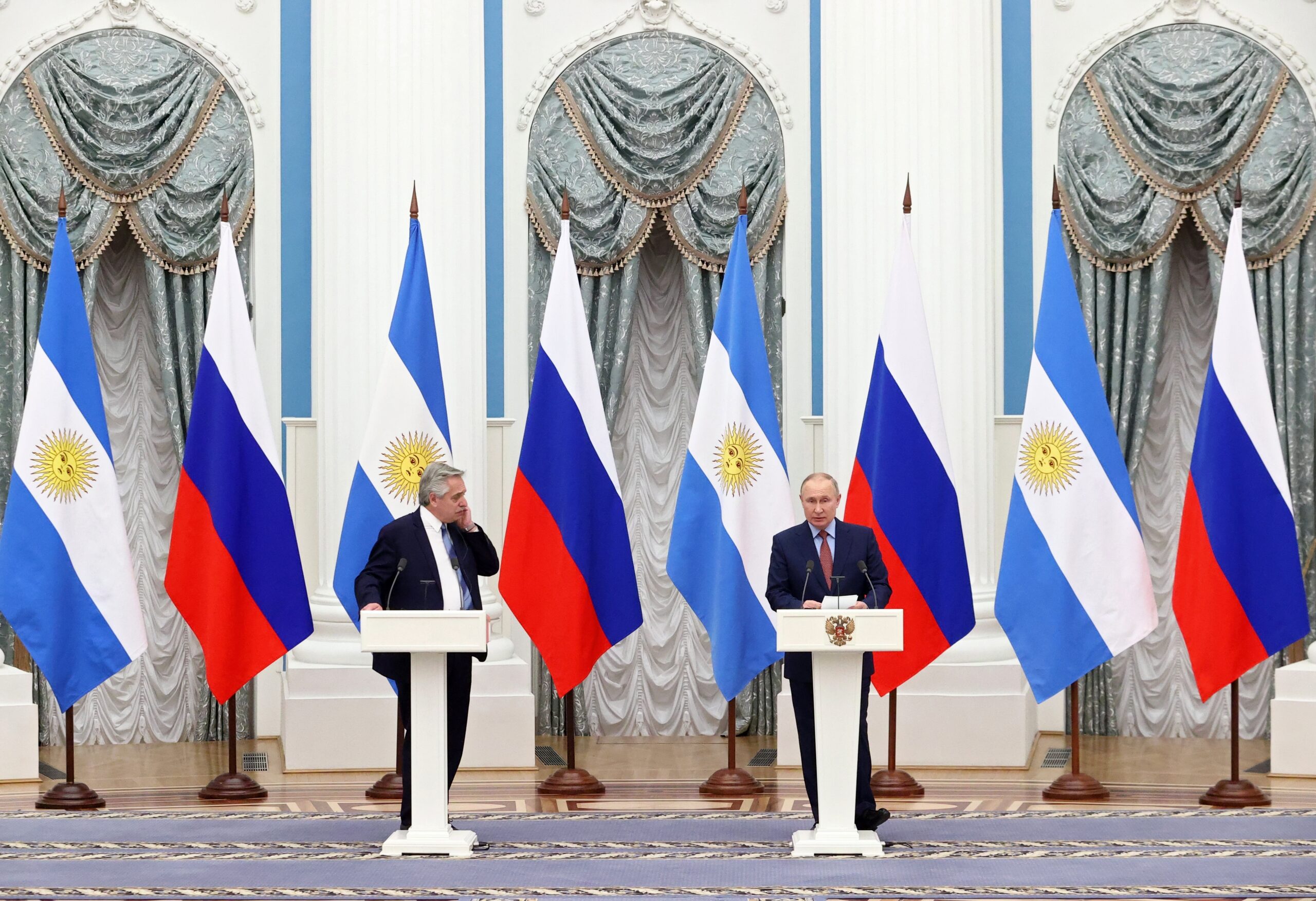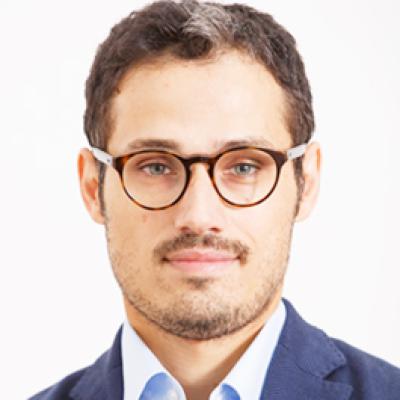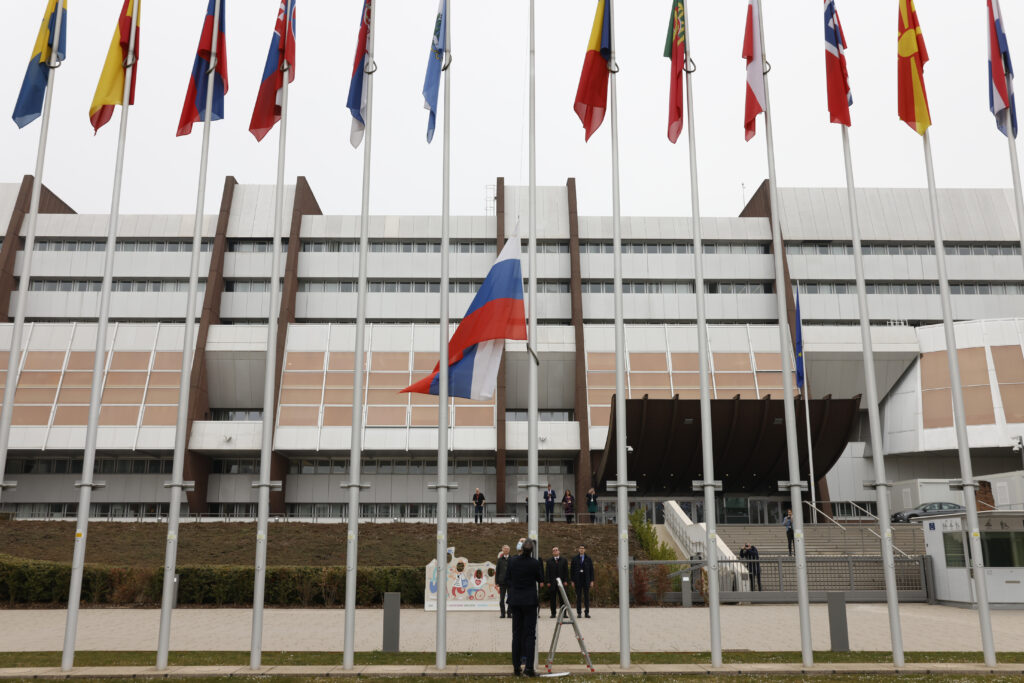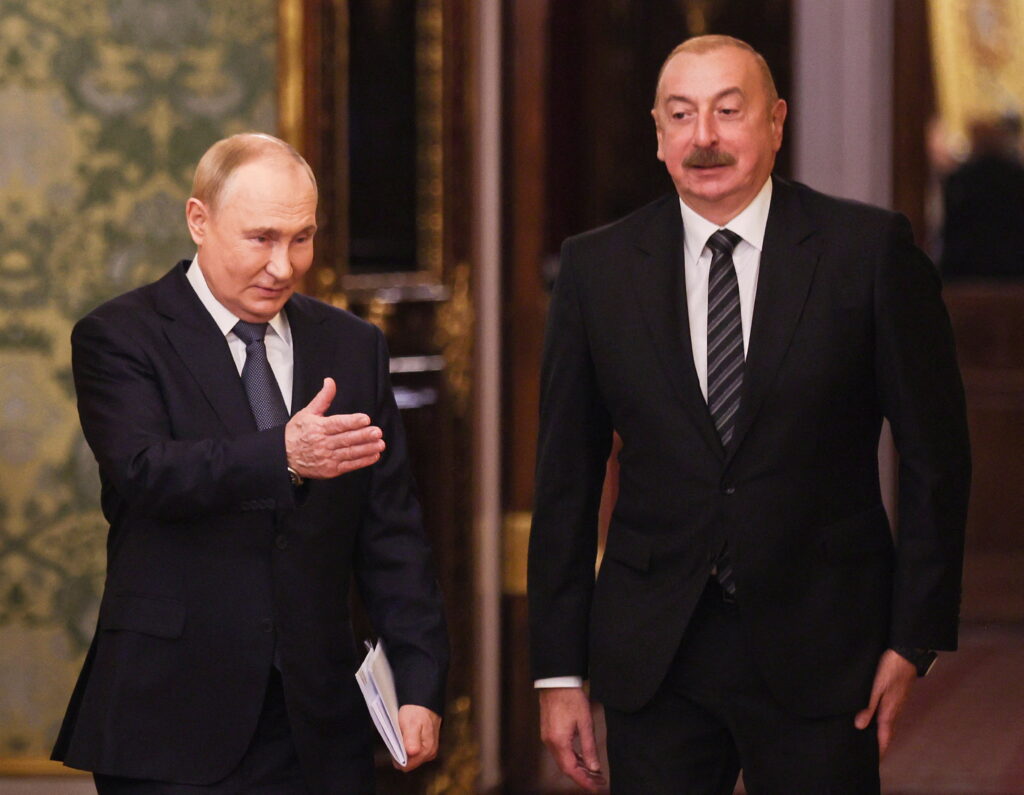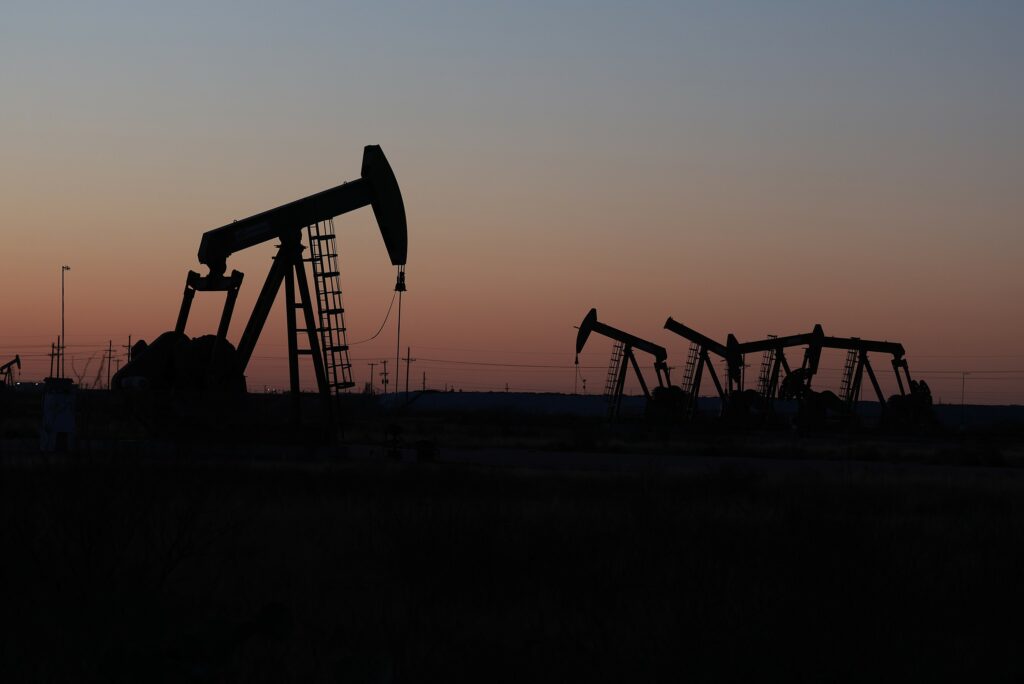Before launching its full-scale war against Ukraine in February 2022, Russia was on the verge of deepening an already extensive strategic partnership with Argentina that dated back to 2008. This goal of closer ties is no longer an urgent priority for either side. Russia’s moves are constrained by sanctions, while its reduced financial resources have been channeled into maintaining its war machine and preserving social-political stability at home. Argentina, meanwhile, has been ambiguous and opaque about where relations with Russia can go in a time of war.
During the first year of the war in Ukraine, Argentina’s Russia policy was particularly ambiguous. In alignment with about 140 other countries, Argentina condemned the Russian military aggression against Ukraine through the resolutions adopted by the UN General Assembly four times already. The last resolution of February 2023, which Argentina has also supported, demanded the withdrawal of Russian troops from Ukraine. And yet, Argentina’s political position has been against alignment with Western sanctions, neither economically nor in other fields since the start of the war. Opposition parties in the South American country have urged the coalition government, led by «Everybody’s Front» (Frente de Todos), to ban Russian propaganda outlets. Yet Russia Today Argentina is still broadcast without restrictions. This request did not have the support of the ruling coalition, which considers the sanction of the Russian media as a violation of freedom of expression, regardless of RT’s corrosive propaganda role in the Global South,. The decision not to join the sanctions, meanwhile, may be motivated by previous political contacts of the incumbent vice president of Argentina, Cristina Fernández de Kirchner. During her presidential term (2007−2015), Kirchner had close contacts with both Dmitry Medvedev and Vladimir Putin. Along with the rejection of sanctions, Argentina also advocates peace, without taking into account the conditions that are imperative for Ukraine, like territorial integrity, military de-occupation (including Crimea) and the punishment of war crimes committed by the Russian state.
From the sovereignty of the Malvin islands to the war in Ukraine
Argentina has a rather complex relationship with Russia, which knows how to take advantage of countries where the West is embroiled in territorial disputes. In the case of Argentina, sovereignty over the Malvinas Islands (population — 3,200; land area — 12,173 km²) in dispute with the United Kingdom is a sensitive issue, which has been frozen after the 74-day war in 1982 in which British forces defeated Argentina. Since then, Russia has shown consistent support for Argentina’s claim to the islands due to their immediate proximity in the South Atlantic. In legal and technical terms, the British authorities administer the territories and refer to them as the Falkland Islands, and there have been referenda to affirm remaining in the UK. After launching a full-scale war against Ukraine, Russia has drawn attention to these disputes over the Falkland Islands on several occasions in a bid to discredit the UK.
In April 2022, the spokesperson for the Russian Ministry of Foreign Affairs, Maria Zakharova, stressed that negotiations between Argentina and the United Kingdom must be resumed to resolve the territorial dispute by peaceful means and in accordance with UN resolutions. In 1982, the UN Security Council Resolution 502 urges the Argentine forces to withdraw from the islands, acknowledges that Argentina invaded, and calls on London and Buenos Aires to resolve the conflict by peaceful means. During that vote on the resolution, the USSR, along with China, Poland, and Spain, abstained, with the UK receiving the support of a total of 10 votes. The Russian leadership appears to be deliberately triggering and exploiting Argentina’s historical memory and national pride by using the talk of the disputed legality of British control of the islands. During the celebration of the victory of the Argentine soccer team in the 2022 World Cup in Qatar, the Vice President of the Security Council, Dmitry Medvedev, stressed that «the Malvinas are Argentine», accusing the British side of «hypocrisy». Medvedev also backed Argentina’s decision to withdraw from the Foradori-Duncan agreement, signed with the United Kingdom in 2016 during the government of former pro-Western Argentine President Mauricio Macri. The Argentine side terminated its participation in the agreement during the G-20 summit in India in March 2023, arguing that it favors the United Kingdom and is not aligned with the integration strategy of the islands within the national jurisdiction of Argentina.
Although Russia has no hesitation to show its position in favor of Argentina’s claim to the Falklands, it likely feels uncomfortable with the official discourse of Buenos Aires. While requesting to restore its sovereignty over the maritime territories, Argentina insists that this would correspond to the national borders before the United Kingdom first installed its control over the islands. Argentine diplomats then link this to the Russian war against Ukraine, seeing both as an assault that violates territorial integrity. Referring to the Ukrainian case, Argentina seeks to use the global geopolitical context to put pressure on the UK, pointing out that the West operates with «double standards» and aims to review the status quo of the Malvinas Islands.
Domestic politics and foreign policy
Russia’s bilateral relationship was influenced by the internal power dynamics in Argentina and the geopolitical context.
The transition from the forces driven by populism, state interventionism, and anti-capitalism under the strong influence of «Peronism» (social justice or «justicialismo») to a shorter period of liberal and market-oriented political forces had an impact on foreign policy agenda setting. Thus, Argentina developed strong ties with Russia when the forces revolving around Cristina Fernández de Kirchner were in power (2007−2015). During that period, the bilateral «comprehensive strategic association» was negotiated and signed (2015). The new qualitative improvement in bilateral relations implied cooperation in the field of nuclear energy, and space and diplomatic synchronicity with Argentine diplomacy for the status of the Malvinas/Falklands.
It should be noted that Buenos Aires had a consensus with Russia on peace negotiations with Ukraine over the Donbas region (occupied by Russia-controlled forces) as part of the Minsk Agreements, while the same initiatives had the support of Germany, France, and other international actors. The «strategic association» was largely overlooked during the first years of the reign of the West-leaning Mauricio Macri, who had to diversify his foreign agenda during the presidency of Donald Trump in the US in 2017. Bilateral relations between Argentina and the US became very personalized between Macri and Trump, who have known each other since the late 1970s. Macri’s intentions to «open» the country to the West, through the American window, after two terms with the Peronists in power, they faced Trump’s transactional approach, including controversial favors. That explains why the strategic dialogue with Russia was maintained, but with more prospects in the economic field than in the political. Bilaterally, Russian exports doubled in 2018, while trade liberalization between the two countries is tied to the future development of trade regimes between the Eurasian Economic Union and MERCOSUR (El Mercado Común del Sur or «El Mercado Común del Sur»), based on the bilateral memorandum of understanding signed in December 2018.
The old policy towards Russia resumed after the «Peronists» returned to power in 2019. At least that was Argentina’s intention, expressed with a huge enthusiasm by its president Alberto Fernández, during the visit to Moscow in February 2022, just a couple of days before Russia launched a large-scale war against Ukraine. The pandemic period (2020−2021) was not easy for bilateral cooperation, even if the Peronists returned to power. Although Argentina was one of the first countries to approve the Russian Sputnik V vaccine, it complained about delays in obtaining the purchased quantity of vaccines. Argentina has even threatened to break the contract if Russia did not supply the promised vaccines. In July 2021, only 12% of the population was vaccinated with a full schedule, with 37% (or 6 million people) waiting for the second dose. In total, the Russian Direct Investment Fund did not supply Argentina with about 18 million vaccines, while promising 25 million doses in December 2020 — January 2021 ($ 19.9 per unit). The limited productive capacities and the problems related to air transport pushed Russia to accept the construction of capacities on Argentine soil (April 2021). That was a minimal compromise to avoid souring the initial success of Russia’s vaccine diplomacy in Argentina. However, due to Russian delays, the Argentine opposition («Together» or «Juntos») managed to force the ruling party to revise legislation allowing donations of Western Pfizer and Moderna vaccines for public health safety reasons.
The shocks of the war in Ukraine and the growing Russian diaspora
While Argentina has sided with Ukraine during international condemnation of military aggression, it has not joined in on Western sanctions. Russia seems to find this enough to qualify Argentina as «a true friend» («un amigo verdadero»). To the extent that Western countries are unable to co-opt Argentina, creating a precedent for the South American and Caribbean region, Russia does not mind Buenos Aires turning to Russia’s war against Ukraine as an argument against the West regarding the Malvinas (the Falklands). At the same time, the deepening of bilateral ties that were sought before the war has fallen into the shadows, at least temporarily. Argentina has other geopolitical priorities. Nor does Russia signal such an intention in its new Foreign Policy Concept, published in March 2023. The document does not mention Argentina at all, though refers to a Russian goal to deepen the cooperation with Brazil and other countries from the region.
The mass exodus of Russians abroad due to the conscription of the male population to fight in Ukraine and the consequences of economic sanctions may upset Moscow a bit. But the flight of the disgruntled population seems a better option for Russian elites than seeing the people take to the streets to overthrow Putin’s regime.
So far, the Russian diaspora in Argentina numbers about 300,000 people, which is almost as large as that made up of ethnic Ukrainians. The new wave of Russians are not refugees, but are fleeing the Russian war against Ukraine, one way or another. Some estimates show that 22,000 traveled to Argentina, but only around 40% stayed. An important point of attraction for the Russians is the right of newborns of foreign parents to acquire Argentine citizenship, in addition to streamlining the procedures for the issuance of citizenships of the parents.
Those Russians who stay or arrive in Argentina, whether or not they are involved in «birth tourism», may encounter financial problems because their savings or even their source of income remain in Russia. To transfer the money, some of them open bank accounts in Georgia and other countries, from where transfers are made to EU countries or the US. So, the Russians in Argentina trust their relatives in the West who send the money to Argentina as the final destination. Only in this way can the Russians obtain foreign currency and live a decent life, avoiding inflationary costs, which are very high in Argentina (more than 100% in February 2023).
Argentine passports allow for travel without a visa in 170 countries. Since the start of the Russian war against Ukraine, especially in the second half of 2022, more than 10,500 pregnant Russian women have entered Argentina. Argentine law enforcement agencies launched several investigations to prevent the «birth tourism» scheme from abusing lax legislation and the pro-immigration Constitution of 1853.
The dynamics within the Russian diaspora in Argentina are one of the echoes of the consequences of the Russian war against Ukraine. Argentina is cautiously selective and tentatively balanced in its policy towards Russia. «Birth tourism» may not be accepted, and Argentina supports Ukraine’s refugees and territorial integrity; yet Buenos Aires still does not feel that the application of sanctions against Russia would be beneficial to stop the war. Argentina’s pro-peace approach suits Russia, which is otherwise struggling to maintain old alliances in the Global South.
